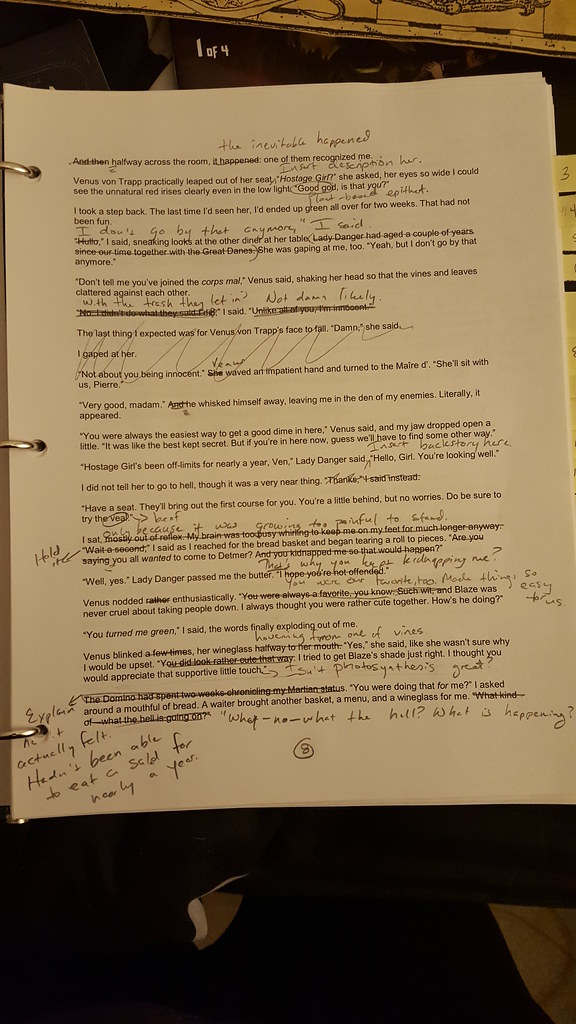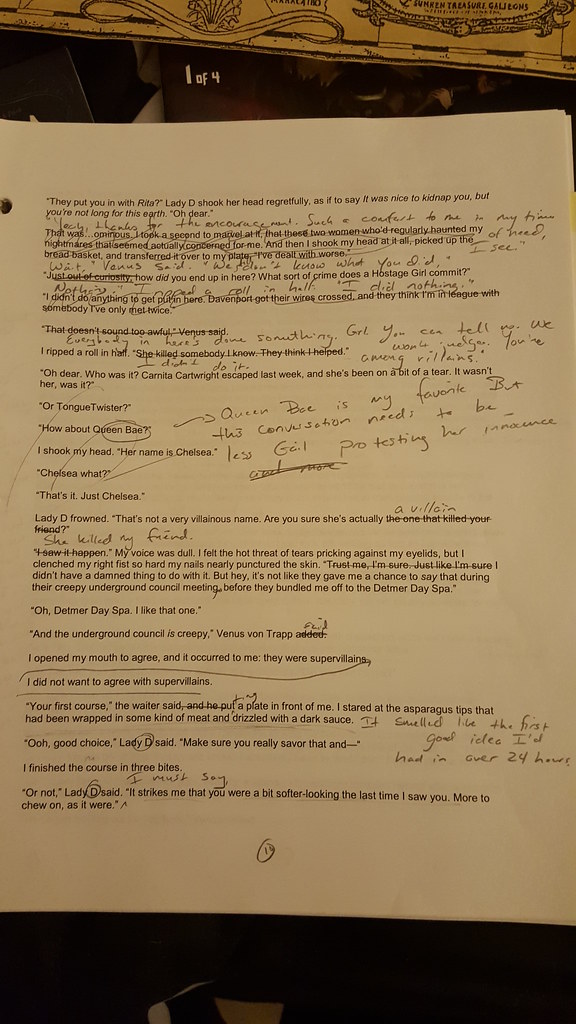Organization and Editing
This weekend proved interesting. I shoveled out quite a lot of the mess that was in my bedroom and I bribed my brother to help move my bed so I have a little more space. You’ve probably seen that my dog Nikki’s had neck problems, so to keep her from jumping off my very high bed, Papa Dunne built her doggie steps. Now that my room’s rearranged and I can see the floor again, we’ll be able to install those.
Cleaning/redecorating gave me new projects, like setting up a nightstand with an old suitcase I found at an antique store a few years back. I finally unpacked my camera collection that I started in college. (Here’s a Facebook album to show off a few of my favorites, including a spiffy red Sabre camera that came with film already exposed inside)
While I was organizing yesterday, I also set up binders for new projects. These are where I keep receipts, research, notes, and the drafts as I go along. I didn’t implement this system until drafting SUPERVILLAINS ANONYMOUS, where I needed accountability, but it proved handy. There are two binders for SUPERVILLAINS: one with my very rough draft, one with my polished draft. The difference between the two is startling.
Most of my writing is done in a poorly set up Scrivener, though I also use Google Docs or MS Word. My first step in editing is usually done by hand on paper. Occasionally I’ll pop the book onto my kindle, which has the similar effect of letting me see the words in a different format. But on the kindle, I can’t really go through and make notes easily. It’s more for reading and big picture consistency. On the printed page, I can make notes.
And boy howdy do I make notes.

This is from Chapter Two. Detmer Prison was difficult. I write in order (with the occasional future scene tucked away), so I couldn’t proceed until I nailed the first few chapters. Not every page has this many markings, though I promise you, there are markings on every page. Five chapters needed extensive rewriting (one took six drafts before I was ready to show it to anybody), which meant the penciling on those pages were off the chart.
When I was younger, I set up a rule with myself: anything handwritten is allowed to be bad. I can be as stupid, silly, as terrible as I like because it’s just writing by hand. My most difficult scenes are written by hand first to get me over the terribleness hump, but it also applies to editing. I’m not professional about it. For example, the original draft of chapter eight has a paragraph where I scratched through it and then wrote myself an essay about why it’s so terrible. Another section is entirely smothered in expletives and self-castigation. I believe I suggested a career change would be in order if I was ever that irresponsible with the English language again. It’s a dumb rule that’s entirely in my head, but it helps.

Another thing that helped me with editing was a book I read in college: ON WRITING WELL by William Zissner. Not a lot stuck except for this bit:
But the secret of good writing is to strip every sentence to its cleanest components. Every word that serves no function, every long word that could be a short word, every adverb which carries the same meaning that is already in the verb, every passive construction that leaves she reader unsure of who is doing what-these are the thousand and one adulterants that weaken the strength of a sentence. And they usually occur, ironically, in proportion to education and rank.
This is a principle I try to follow, which is why my editing tends to pare down/replace rather than add. A lot of times, I turn it into a game, to see how many words I can cut while keeping the integrity of the scene in place. Sometimes I can go overboard, but hey, that’s why my editor gets paid the big bucks. But editing is the bane of many writers’ existence. We hate being confronted with our weaknesses and the idea that we might be making things worse instead of better: it’s a feeding ground for things like our insecurities and our perfectionism, and it becomes a vicious cycle of self-doubt and self-congratulations. We need clear heads and all of our problem solving skills. There’s a reason Hemingway said “Write drunk, edit sober.”
I try to stick to this, though my handwriting might convince people otherwise.
(To see the final draft, check out Chapter Two right here on the blog!)
Quick Announcements
If you missed it, I was on John Scalzi's blog on Friday, talking about writing mid-sized heroes like Gail!Doing three giveaways this week, so pay attention to my Tumblr, Twitter, and Facebook.
Have you entered my newsletter giveaway yet? Free signed copy of SUPERVILLAINS ANONYMOUS.











Ahem.
ReplyDeleteBless you.
DeleteI love the fact that your writing reference states don't use big words then throws in the word "adulterant".
ReplyDelete